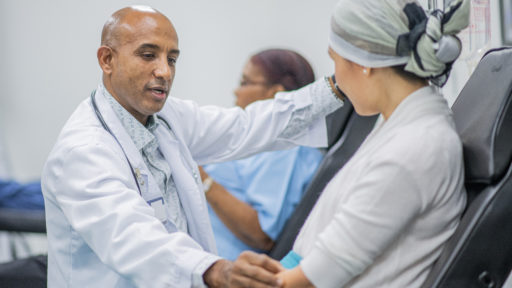Description
Dr. Sonia T. Orcutt is a surgical oncologist at UAMS Health. She treats a wide range of cancers, including those affecting the liver, pancreas, gallbladder, adrenal gland, small bowel, appendix, and stomach, as well as skin cancers and soft tissue sarcomas. She has a particular interest in minimally invasive techniques, such as laparoscopic and robotic surgery. Dr. Orcutt is passionate about providing personalized care through a multidisciplinary approach, ensuring streamlined and effective cancer treatment for her patients.
Video Player
Transcript
Hi, I’m Sonia Orcutt. I’m a surgical oncologist here at UAMS Health.
I really love being a surgical oncologist, partly because of what I can do surgically and really make rapid improvements in patients, and also partly because — particularly in patients with cancer — I can give them hope and I can give them quality of life back with their family.
I see patients with a wide variety of cancer types. I see patients with skin cancers, including ones that have a risk of metastasizing like melanoma. I see patients with soft tissue cancers, either within their bellies or even on their arms or legs. And then I see patients with a whole host of complex issues like stomach cancers, pancreas, liver, small intestine.
I think probably the most important thing for patients to understand when they come and see us is that we are thinking about each patient individually. So everyone’s tumor is going to be in a slightly different spot. Everyone’s tumor is going to behave a little bit differently. And so it’s important for me to consider that particular tumor in that particular patient to understand their other medical problems and their wants and desires so that we can all come to the best decision about how best to treat each individual patient.
I think the benefit of seeing someone like me in a center like this — with a lot of other physicians of different specialties and a lot of research opportunities and a lot of new things on the horizon — is that we can get patients the optimal, best care that they can get. We get a lot of people who put their heads together — other surgeons like myself, medical oncologists, and radiation oncologists, occasionally we’ll need the orthopedic surgeon or the urologist or the gynecologic oncologist — people of different specialties all coming together, all thinking about each patient individually.


